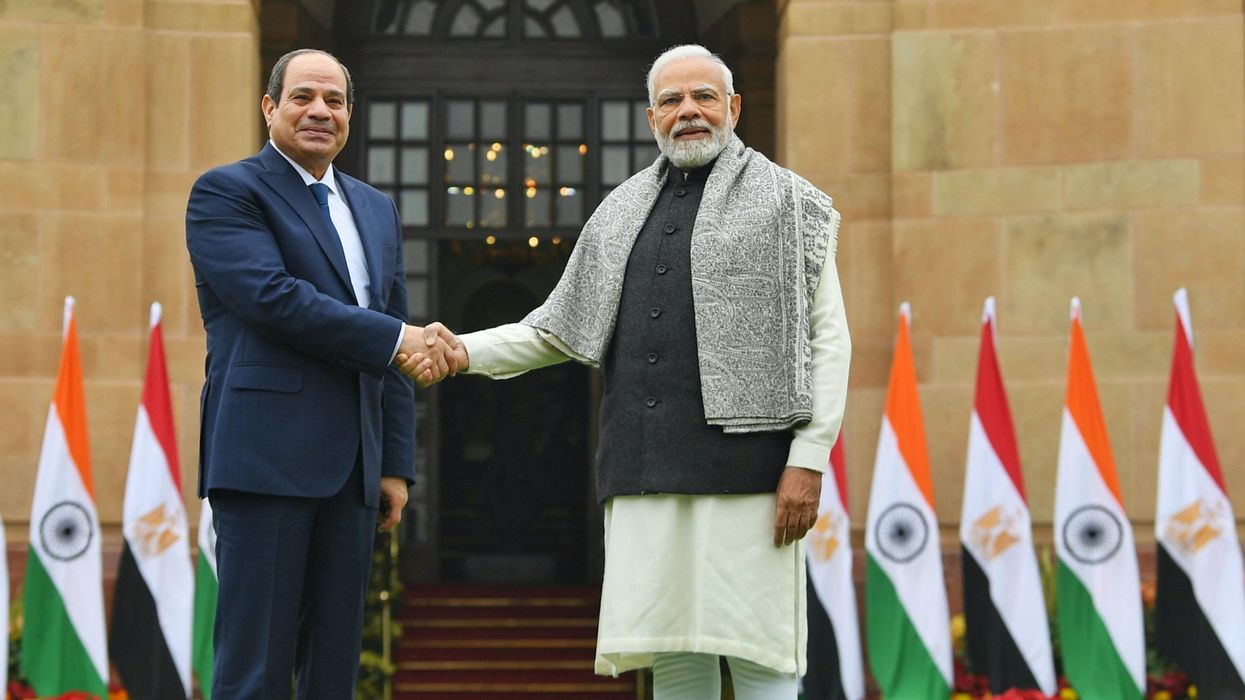This post was originally published on The Asian Age | Home.
-
A senior BJP leader said that in order to win more seats in the 2024 elections, the party has already started its preparation
-
Manickam Tagore, the party’s whip in Lok Sabha, said there is an emergency situation due to diminishing shares of the Adani group
This post was originally published on The Asian Age | Home.
-
Tata Advanced Systems Ltd in a joint collaboration with Airbus Defence will manufacture the C 295 aircrafts at Vadodara in Gujarat
This post was originally published on The Asian Age | Home.
-
My government always kept the country’s interest paramount, showed the will to completely change the policy-strategy, President said
This post was originally published on The Asian Age | Home.
-
The Italian passenger identified as Paola Perruccio was arrested by Sahar police after the flight landed in Mumbai
This post was originally published on The Asian Age | Home.
-
The Prime Minister firmly exuded confidence that Union Finance Minister Nirmala Sitharaman will make efforts to meet the aspirations
This post was originally published on The Asian Age | Home.
-
The route to social justice in India is steeped in dichotomy; one that is wadded with U-turns and dead ends that set its progress several decades back every so often. Even as the nation is all set to appoint its first “openly gay” judge in independent history, conservative backlash against NCERT’s pathbreaking teacher training manual titled “Inclusion of Transgender Children in School Education: Concerns and Roadmap” and its consequent withdrawal has once again given public morality the upper hand over its constitutional counterpart and failed to protect fundamental rights of an entire social community.
When an incredibly diverse population is straitjacketed as binary and heteronormative, any attempts at spreading awareness are dubbed as “exposure”, while attempts at making educational curricula more inclusive are parroted as against the “cultural fabric of the nation.” Section 29(a) of the Right to Education Act1 asks academic authorities to conform with the values enshrined in our Constitution. And for the first time, a national level body sought to address a gender-biased, discriminatory school culture and replace it with a sensitised and gender diversity-informed teaching base, thereby aligning it with constitutional values of equality, liberty and justice. While it may very well appease a number of people, the move to withdraw the Module falls in direct contradiction to not only Fundamental Rights as guaranteed by the Constitution but also the United Nations Convention on Rights of the Child2, to which India stands signatory to since 1992. The Convention’s primary goal is to view every child as a complete human, worthy of independent thought and self-expression, bolstered by principles of non-discrimination, right to live with dignity and holistic development. By suppressing information that is vital for transgender and non-binary children to feel accepted, heard and safe, their birth rights are very cunningly controversialised and served up for debate.
Apart from international conventions, the validity of the withdrawal can further be juxtaposed with domestic judicial pronouncements. While originally envisaged in the context of rights of illegitimate children, the Hon’ble Supreme Court’s 1997 Gaurav Jain judgement3 can be effectively used to protect transgender and gender non-conforming children’s fundamental rights to life, dignity, equal opportunity and holistic integration into mainstream society- “(The) children have the right to equality of opportunity, dignity and care, protection and rehabilitation by the society with both hands open to bring them into the mainstream of social life without pre-stigma affixed on them for no fault of theirs… Abandoning the children, excluding good foundation of life for them, is a crime against humanity.” The Court, in the same judgement reinforced the 10 principals of The United Nations Declaration on the Rights of the Child4 and asked the relevant state authorities to closely adhere to it. Similarly, in National Commission for Child Rights v Rajesh Kumar5, the Court directed the Central and various State-level Child Rights Commissions (NCCR) to effectively implement provisions of the Commissions for Protection of Child Rights Act6 that gives notable recognition to “children in need of special care and protection including children in distress, marginalised and disadvantaged children.”
In a binary-coded heteronormative society, intrinsic parts of what makes one human such as personhood, self-expression and dignity are often entrapped within binary-gendered bodies. This is the root cause of constant alienation of trans folks from their supposedly “inalienable” rights. When certain bodies are dehumanised and subjected to unending scrutiny and stigmatisation, their suppression of (self) expression too becomes rather digestible. Trans children are victims of consistent institutional gaslighting and cultural invisibalisation which severely hinders their right to participate and engage in socio-educational contexts that are fulfilling, inclusive and pro-dialogue. It thus also becomes the NCCR’s duty to demand bringing back the NCERT Manual and ensure trans and gender non-conforming children are not robbed off their fundamental right to a dignified and secure life.
As Kofi Annan once very eloquently put it- “There is no trust more sacred than the one the world holds with children. There is no duty more important than ensuring that their rights are respected, that their welfare is protected, that their lives are free from fear and want and that they can grow up in peace.”
This post was originally published on LSE Human Rights.
-
The yatra traversed 12 states and two Union territories in nearly five months after its launch on Sept 7 last year, clocking over 4,000 km
This post was originally published on The Asian Age | Home.
-
Shops, business establishments and the weekly flea market were closed as part of the security exercise for the flag unfurling
This post was originally published on The Asian Age | Home.
-
Modi said his government had unleashed digital, start-up and innovation revolutions which are benefiting the youth
This post was originally published on The Asian Age | Home.
-
Two pilots ejected safely, but the third one is missing
This post was originally published on The Asian Age | Home.
-
Kharge said he is writing after the unfortunate security lapse during the Bharat Jodo Yatra
This post was originally published on The Asian Age | Home.
-

As Indian Prime Minister Narendra Modi welcomed Egyptian President Abdel Fattah El-Sisi as the chief guest at his nation’s 74th Republic Day celebrations, Amnesty International on Thursday led calls for both right-wing leaders to “address the ongoing human rights and impunity crises” in their respective countries.
Meeting ahead of events commemorating the adoption of India’s constitution—including a military parade in which members of the Egyptian army marched—Modi and El-Sisi agreed to elevate bilateral ties to a “strategic partnership,” while calling for a “coordinated and concerted” effort to combat “terrorism.”
Modi—who said Wednesday that he and El-Sisi “are in agreement that terrorism is the biggest threat to humanity”—has, like his Egyptian counterpart, been accused of using anti-terrorism laws to crush critics and silence dissent.
“The current human rights crises in India and Egypt are characterized by entrenched impunity and misuse of counterterrorism legislation to clamp down on civic space and peaceful dissent.”
“The current human rights crises in India and Egypt are characterized by entrenched impunity and misuse of counterterrorism legislation to clamp down on civic space and peaceful dissent,” Philip Luther, Middle East and North Africa research and advocacy director at Amnesty International, said in a statement.
“Both countries show striking parallels in their attempts to harass and intimidate into silence all actual or perceived government critics and opponents. This unrelenting assault on human rights must end,” he added.
\u201cThe Indian and Egyptian authorities must address the ongoing human rights and impunity crises in the two countries. Both show striking parallels in their unrelenting assault on rights. https://t.co/gbmoAkMnXT\u201d— Amnesty India (@Amnesty India) 1674710907As Amnesty noted:
In recent years, authorities in both countries have severely repressed the rights to freedom of expression, association, and peaceful assembly and failed to address entrenched discrimination against religious minorities.
[…]
Human rights defenders, lawyers, political opponents, peaceful protesters, academics, and students, face arbitrary arrests and detention, unjust prosecutions, and other forms of harassment and intimidation solely for their peaceful exercise of their human rights in both India and Egypt.“India and Egypt seem to have taken their long-standing bilateral cooperation to a different level where they share tactics to increasingly repress rights and freedoms,” Amnesty International India board chief Aakar Patel said in a statement. “As the leaders of the two countries take the center stage, celebrations of the adoption of India’s constitution 74 years ago should not overshadow the grim reality that the human rights situations in both countries have been on a downward spiral.”
\u201c\u201cThe current human rights crises in #India & #Egypt are characterized by entrenched impunity and misuse of counterterrorism legislation to clamp down on civic space & peaceful dissent\u201d, @amnesty said today, as India hosts President Sisi as the chief guest at its Republic Day.\u201d— Nuria Tes\u00f3n (@Nuria Tes\u00f3n) 1674743767Leading an open letter from Egyptian and Indian diaspora members published Tuesday by the Canadian alternative news site rabble.ca, Ehab Lotayef, Samaa Elibyari, and Jooneed Jeeroburkhan noted that India’s constitution “guarantees full equality and rights to all Indians and declares the country a secular, socialist republic.”
“However today’s India is led by a Hindu ethno-nationalist party committed to converting it into a Hindu nation,” the authors continued, and “the government of India has been called out by domestic and international human rights organizations for unleashing and engendering violence and detentions against Muslim, Dalit, and Christian minorities as well as any human rights defenders.”
“Meanwhile, January 25 marks the start of the 17 days in 2011 which forced one of the region’s longest-serving and most influential leaders, Egyptian President Hosni Mubarak, from power,” they continued. “We recall that moment of incredible exhilaration as all Egyptians aspired to more democracy and social justice. Unfortunately, on July 3, 2013, then-Gen. Abdel Fattah El-Sisi staged a coup d’état that toppled President Mohamed Morsi, the first democratically elected president of Egypt, and returned the country to dictatorial rule.”
\u201c”What is happening in Egypt and India should be of interest to all Canadians, even if they are not of Egyptian or Indian origin. Support for governments that violate fundamental rights diminishes democracy everywhere.” https://t.co/sXAmcQlOba\u201d— Canadians for Justice and Peace in the Middle East (@Canadians for Justice and Peace in the Middle East) 1674656645“Since his ascent to power through dubious elections, El-Sisi has governed Egypt with an iron fist,” the trio wrote. “Under his direct command, on August 14, 2013, two encampments of protesters in Rabaa and al-Nahda squares, demanding that President Morsi be reinstated, were dismantled by lethal force and more than 1,000 people were killed.”
“To date, no one has been held accountable,” the authors added. “Since then, all dissenting voices have been silenced and more than 60,000 political prisoners languish behind bars in abject conditions.”
This post was originally published on Common Dreams.
-
On 23 January 2023, INS Vagir, the fifth P75 Kalvari-class submarines, was commissioned within the Indian Navy in presence of the Chief of Naval Staff, Admiral R Hari Kumar, PVSM, AVSM, VSM, ADC and several other senior dignitaries. The event was also attended by Naval Group’s Executive Vice President for Submarines, Mr Laurent Espinasse along […]
The post Commissioning of INS Vagir, the fifth Kalvari-class submarine entirely made in India based on Scorpene® design appeared first on Asian Military Review.
This post was originally published on Asian Military Review.
-
Anil Antony announced his resignation via a tweet in which he said that he was getting ‘intolerant calls’ to retract his tweet
This post was originally published on The Asian Age | Home.
-
Students claimed that they were attacked when they were watching the documentary on their mobile-phones as the screening could not be held
This post was originally published on The Asian Age | Home.
-
PM unveiled the model of the National Memorial dedicated to Netaji to be built on Netaji Subhas Chandra Bose Dweep
This post was originally published on The Asian Age | Home.
-
AIBA welcomed the Government’s move to block YouTube channels and Twitter handles that spread a venomous documentary of the BBC
This post was originally published on The Asian Age | Home.
-
India’s Defence Acquisition Council approved the procurement of the Very Short Range Air Défense System (VSHORADS) missile system which was developed by the county’s defence Research and Development Organization (DRDO). The acquisition is one park of a larger weapon package worth Rs4,276 crore for the Army and Navy. The VSHORADS buy will replace the Russian […]
The post Indian Army Procuring Domestic Man Portable Air Defence Missile appeared first on Asian Military Review.
This post was originally published on Asian Military Review.
-
At DGPs’ meet Prime Minister advocates for better Centre-state cooperation
This post was originally published on The Asian Age | Home.
-
After a day-long break, the foot march started as per schedule from Hiranagar near the International Border along Jammu-Pathankot highway
-
PM says country is taking huge strides in infrastructure
This post was originally published on The Asian Age | Home.
-
Opposition parties gave preference to vote bank politics, alleged Prime Minister
This post was originally published on The Asian Age | Home.
-
Today the three Martin Ennals Award Laureates 2023 were announced !
The 2023 Laureates — Delphine Djiraibé (Chad), Feliciano Reyna (Venezuela), and Khurram Parvez (Jammu and Kashmir) — have each dedicated over 30 years of their lives to building movements which brought justice for victims, accountability from leaders, or medicines to the marginalized. They have made human rights real for thousands of people in their communities, despite the ongoing, sometimes life-threatening, challenges they endure. For more on this award and its laureates, see: https://www.trueheroesfilms.org/thedigest/awards/043F9D13-640A-412C-90E8-99952CA56DCE
———————

Delphine Kemneloum Djiraibé was one of the first female lawyers in Chad and a pioneer of the human rights movement in one of the poorest countries in the world, fraught with corruption and human rights abuses. Convinced that her role is to “challenge the power”, Delphine has advocated on behalf of victims and the democratic process for over 30 years. She was a key figure in bringing the former dictator Hissène Habré to justice. Djiraibé heads the non-governmental organisation Public Interest Law Center (PILC), which trains volunteers and accompanies citizens seeking justice for violations of their rights. In recent years she has been particularly active in combating gender-based violence and is in the process of establishing the first women’s counselling center in Chad, which will include an emergency shelter for women affected by domestic violence. See also: https://www.trueheroesfilms.org/thedigest/laureates/5B701F71-12FD-B713-9F99-5E09B9AFD6DA

After the death of his partner Rafael from AIDS in 1995, Feliciano Reyna, then an architect, founded Acción Solidaria to provide much needed medication and treatment to Venezuelans living with HIV & AIDS. Feliciano and Acción Solidaria began advocating for access to health for the marginalised LGBTQI population in a country where healthcare was on the decline and corruption on the rise. They created the first national AIDS Help Line in Venezuela and ran a national awareness campaign on HIV & AIDS, which aired on TV and in movie theaters, and received radio and magazine coverage. Feliciano Reyna went on to found CODEVIDA, a coalition of Venezuelan organisations promoting the rights of Venezuelan citizens to health and life. As he put it: “We walked directly into the complex humanitarian emergency in Venezuela”. Despite ongoing threats, since 2006, he has worked closely with UN mechanisms to defend human rights in his country. In 2019 his advocacy was instrumental in establishing the Independent International Fact-Finding Mission on Venezuela.

At the age of 13, when Khurram Parvez witnessed the shooting of his grandfather during a protest demonstration against the molestation of women outside his house in Kashmir, he chose to “not incite violence and become part of some revenge” , but rather to become a “nonviolent activist“. He founded the Jammu and Kashmir Coalition of Civil Society (JKCCS) and is the Chair of the Asian Federation Against Involuntary Disappearances. For 15 years he has travelled to the most remote parts of the region to sit with victims of abuse, collect documentation and report on their stories. Under his leadership, the JKCCS has been highly effective in translating the protections guaranteed in international human rights law into local realities. Despite continued attacks on his right to freedom of expression by the Indian government, being jailed in 2016 and losing a leg to landmines, Khurram relentlessly spoke the truth and was an inspiration to civil society and the local population. In November 2021, he was arrested under the Unlawful Activities Prevention Act (UAPA) on politically motivated charges. He remains detained without trial in India. See also: https://www.trueheroesfilms.org/thedigest/laureates/81468931-79AA-24FF-58F7-10351638AFE3
You can watch them take questions from the press at the Club Suisse de la Presse, livestreamed on February 14th, 2023 from 12h CET.
A celebration of the Laureates 2023 will take place on 16 February at the Salle communale de Plainpalais in Geneva, at 6:30pm. The event is open to the public and livestreamed from the Martin Ennals Foundation’s website and Facebook page. Sign-up to the Ceremony
This post was originally published on Hans Thoolen on Human Rights Defenders and their awards.
-
The term of the three assemblies is ending on different dates in March
This post was originally published on The Asian Age | Home.
-
The top court said what was required was a “will and a pure heart” to enforce the existing laws
This post was originally published on The Asian Age | Home.
-
The Session will have 27 sittings and will continue till April 6 with a month-long recess to examine the budget papers
-
PM virtually flagged off the world’s longest river cruise, the MV Ganga Vilas, from Varanasi which will travel 3,200 km to reach Dibrugarh
-
ICG Director General V S Pathania shared the roadmap after he commissioned Kamla Devi, the last in the series of five fast patrol vessels
This post was originally published on The Asian Age | Home.
-
The counsel for the accused made the submission before additional sessions judge Harjyot Singh Bhalla
This post was originally published on The Asian Age | Home.